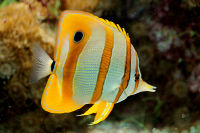Difference between revisions of "Chelmon rostratus"
From The Aquarium Wiki
m |
(→External links) |
||
| (6 intermediate revisions by 3 users not shown) | |||
| Line 11: | Line 11: | ||
|family=Chaetodontidae | |family=Chaetodontidae | ||
|captive_bred=No | |captive_bred=No | ||
| − | |difficulty= | + | |difficulty=D |
|min_size=19 | |min_size=19 | ||
|max_size=20 | |max_size=20 | ||
| Line 81: | Line 81: | ||
*[http://www.fishlore.com/profile-copperbandbutterflyfish.htm Fishlore] | *[http://www.fishlore.com/profile-copperbandbutterflyfish.htm Fishlore] | ||
*[http://www.austmus.gov.au/fishes/fishfacts/fish/crostratus.htm Austmus.gov.au] | *[http://www.austmus.gov.au/fishes/fishfacts/fish/crostratus.htm Austmus.gov.au] | ||
| + | *[https://connectfishfriends.com/livestock-details/copperband-butterfly Connect Fish Friends - Copperband Butterfly] | ||
Latest revision as of 02:34, 26 October 2023
Copperband Butterflyfish
Chelmon rostratus
284 Litres (75 US G.)
19-20 cm (7.5-7.9")
8.1 - 8.4
23.9-27.8°C (75 -82 °F)
8-12 °d
1:1 M:F
2-5 years
Family
Chaetodontidae
Contents
Additional names
- Copperband Butterflyfish, Beaked Coralfish, Copper-Banded Butterflyfish
Additional scientific names
- Chaetodon rostratus, Chelmo rostratus, Chaetodon enceladus, Chelmon rostratus
Sexing[edit]
- These fish are difficult to sex visually.
Tank compatibility[edit]
- This fish is not compatible with soft corals, anemones and small inverts. It should not be kept with very aggressive fish and may well not get along with other Butterflyfish. Keep with robust but peaceful fish.
Diet[edit]
- Primarily carnivorous, feed this fish small meaty foods such as mysis shrimp, clams, mussels and brine shrimp. They may well only accept live food until they have acclimated in your tank. Will also eat pest aiptasia anemones.
Feeding regime[edit]
- Feed once or twice a day.
Environment specifics[edit]
- Needs an SG of 1.020 - 1.025. The tank should be spacious and well matured (at least 6 months old) with live rock to swim amongst and hide.
Behaviour[edit]
- A mid-swimming predator towards small foods. Can be very fragile in captivity and prone to various parasites and diseases. Should only be attempted in mature tanks by experienced keepers.
Identification[edit]
- A distinctive looking fish, high sided and rounded in shape with large angular dorsal, pelvic and anal fins. The snout is striking as it's long and slender, the mouth is small. The body is iridescent white-silver with 4 vertical yellow-orange bands running down the body, including one that goes through the eye. It has a dark false "eye" on the dorsal fin to confuse predators, there is also a slender dark band through the caudal peduncle.
Pictures[edit]
External links[edit]
- Fishbase (Mirrors: Error creating thumbnail: Unable to save thumbnail to destination)


